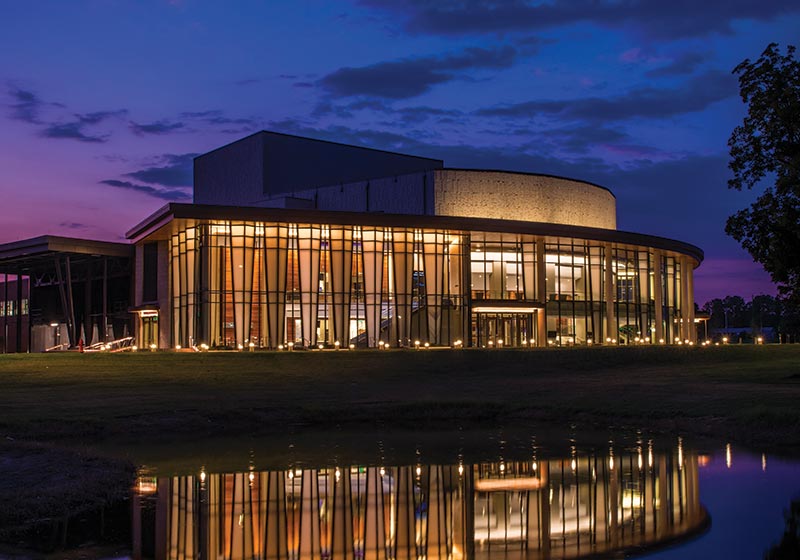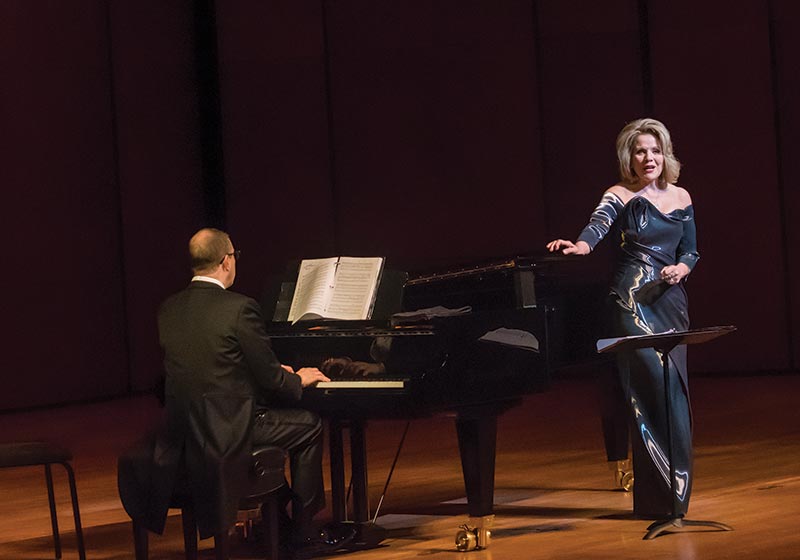Blending the arts with education and research is central to GPAC’s mission and programming
Article body
A few short months ago, the new Jay and Susie Gouge Performing Arts Center at Auburn University lit the spotlight and raised the curtain on its first stage performance, and from the start, its programming has blended the arts with education and research for the betterment of the community.
Virtually every performance to date in this inaugural season has included a separate event involving the artists engaged with the community at large as well as Auburn’s academic and research faculty. Perhaps none, though, has more clearly demonstrated this purpose than the performance Sept. 23 by renowned opera soprano, Renée Fleming.
Fleming is a recipient of the National Medal of Arts—the highest honor the United States can bestow on an artist. She has many other accolades as a performer, but she also is passionate about her belief in the effect music and the arts can have on our society, especially the brain itself.
Fleming spearheads a collaboration with the National Institutes of Health. Her Sound Health initiative, in association with the National Endowment for the Arts, explores and brings attention to research and practice at the intersection of music, health and neuroscience. This initiative has also led the NIH recently to award $20 million in funding for music and neuroscience research over five years.
Fleming’s program, Music and the Mind, explores the power of music as it relates to health and the brain. It focuses on such topics as childhood development, cognitive neuroscience, evolution, music therapy and the impact on health care, the impact of music education, music and social cohesion, and the future of music in medicine.
Fleming invites experts to present their research and discuss their experience as part of her presentations. She also investigates the evolutionary role music may have played in creating community, as well as case studies and individual stories of how music has changed lives. In each location where she performs, she collaborates with leading local neuroscientists, researchers, physicians, music therapists, educators and universities. Her goal is to bring this information to her audience and amplify the amazing work happening at the intersection of music, health and neuroscience.
“The Music and the Mind program was the perfect blend of research and outreach,” said Dr. Jeff Katz, Alumni Professor in the Department of Psychology in the College of Liberal Arts, and principal investigator with the Comparative Cognition Laboratory. “The program showcased a unique mixture of active research areas at Auburn related to how the arts, music and observational drawing, can heal the mind and brain. The open discussion between Renée Fleming, the Auburn faculty and the audience further provided an excellent opportunity to educate the general public.”
Dr. Nancy Haak, an associate professor in the Department of Communication Disorders, teaches graduate courses in neurogenic communication disorders. She shared a similar view: “Research, linking our memories to the music that ’speaks’ to us, holds much promise for those facing a devastating diagnosis of dementia,” Haak said. “To be able to offer a means of maintaining connection/communication with loved ones, via the music of their life, seems most encouraging in a future fraught with loss.”
“I loved the opportunity to share the work my lab has been conducting related to music and listening skills with the audience,” added Dr. Aurora Juliet Weaver, an assistant professor in the Department of Communication Disorders and lead researcher in the Auditory and Music Perception Lab.
“It was a privilege to have our NEA-funded study that investigates the impact that drawing has on the brain included,” said Barb Bondy, the Jane Dickinson Lanier Professor in the Department of Art and History. “It is widely understood that communities thrive where the arts flourish. Over the last decade we have seen scientific evidence of the profound impact that the arts have on the brain and the power of the arts to help individuals think creatively, thrive and heal.”
The Jay and Susie Gogue Performing Arts Center at Auburn University is East Alabama’s premier performing arts venue, presenting touring Broadway productions, opera, dance, chamber arts, popular musical performances and student and faculty music and theater performances. The Gogue Center is home to both the 1,202-seat Woltosz Theatre and 3,500-capacity amphitheatre at the City of Auburn Lawn and Porch, with 17,000 square feet of open space for outdoor performances, community festivals and events. Located at 910 South College Street, directly opposite the Jule Collins Smith Museum of Fine Art, the Gogue Center serves as a twin pillar of Auburn’s bourgeoning arts district, a cultural hub for the university, community and region. More information and a full slate of upcoming performances can be found on its website: <a href="//goguecenter.auburn.edu/">goguecenter.auburn.edu/</a>.
Auburn University is a nationally ranked land grant institution recognized for its commitment to world-class scholarship, interdisciplinary research with an elite, top-tier Carnegie R1 classification and an undergraduate education experience second to none. Auburn is home to more than 30,000 students, and its faculty and research partners collaborate to develop and deliver meaningful scholarship, science and technology-based advancements that meet pressing regional, national and global needs. Auburn's commitment to active student engagement, professional success and public/private partnership drives a growing reputation for outreach and extension that delivers broad economic, health and societal impact. Auburn's mission to educate, discover and collaborate drives its expanding impact on the world.



